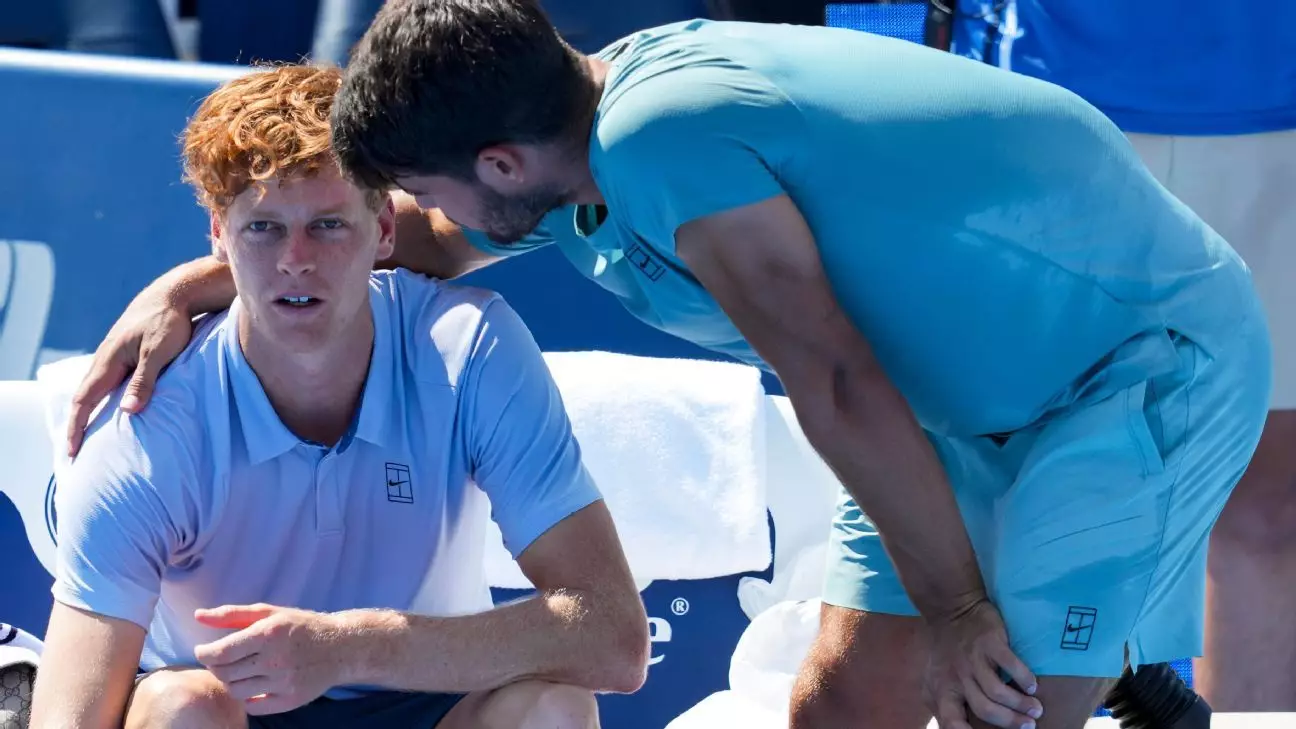The Cincinnati Open, renowned for its high stakes and intense competition, delivered an unusual and poignant story this year. The highly anticipated showdown between Jannik Sinner and Carlos Alcaraz was abruptly cut short, showcasing the unpredictability inherent in sports. As Sinner withdrew due to illness just 22 minutes into the match, the tennis world was reminded that even the most meticulously prepared athletes are vulnerable to physical setbacks. This sudden occurrence not only altered the outcome but also shifted the narrative around resilience, health, and the unpredictability of high-performance sports.
What makes this event particularly notable isn’t solely the victory of Alcaraz but the circumstances surrounding the match itself. The tournament’s final, historically a symbol of culmination and fierce rivalry, was reduced to a brief spectacle, highlighting how health issues can unexpectedly change competitions. Sinner’s condition—marked by apparent fatigue and physical distress—underscores the importance of physical readiness, especially during the intense heat and demanding schedule leading up to the US Open. While some may view this as an anticlimax, it emphasizes that resilience extends beyond the court’s baseline; it encompasses mental toughness in facing unforeseen health challenges.
Alcaraz’s Champion Spirit and the Battle for Supremacy
In the absence of a traditional contest, Alcaraz’s response was both gracious and emblematic of his rising stature in the sport. His words reflected a genuine concern for Sinner’s well-being, emphasizing sportsmanship and respect. Yet, beneath his courteous demeanor lies a player driven by ambition and an unyielding desire to claim victory. This moment, while accidental, becomes a testament to Alcaraz’s psychological resilience—he adapted swiftly to the situation and rose to the occasion without fanfare or complacency.
The victory propels Alcaraz further into the top echelons of men’s tennis. His previous loss in Cincinnati loomed as a psychological challenge, but this win—though unconventional—cements his status as a formidable competitor. His ability to remain focused amid unforeseen circumstances is indicative of a player who can thrive under pressure and adversity. Furthermore, Alcaraz’s victory signals a shift in the ATP landscape; he is no longer just a rising star but a genuine contender for the major titles that define a player’s dynasty.
Health and Competition: The Unseen Battle
Sinner’s withdrawal brings to light a vital issue often overshadowed by the glamour of surface-level victories. The physical toll of elite tennis is immense, and health issues can unexpectedly threaten the trajectory of even the most promising athletes. Sinner had been on a remarkable streak—12 consecutive wins and 26 straight matches on hard courts—highlighting his current dominance. Yet, his sudden inability to continue underscores that physical well-being remains the backbone of sustained success in professional sports.
This incident sparks a broader conversation on player health management, recovery protocols, and the pressures to perform continuously. As much as talent and mental toughness matter, physical robustness is equally critical. The delicate balance athletes must maintain—pushing limits without compromising health—is a challenge that the sport’s governing bodies and individuals need to address more openly. Skipping a match due to illness is a rare event but a reminder that even the best are vulnerable and that tournaments must prioritize athlete well-being.
Implications for Future Tournaments and the Road Ahead
The aftermath of this match reverberates beyond Cincinnati, especially with the imminent US Open. Historically, the Cincinnati champion has often gone on to succeed at Flushing Meadows, hinting at this tournament’s role as a crucial preparatory stage. Alcaraz, now holding the winner’s trophy, appears primed for a strong US Open campaign, further fueling narratives of new generations of champions rising to challenge the established hierarchy.
However, the true significance lies not just in this year’s results but in the broader message about the evolving mental and physical resilience of elite players. As the sport progresses, so does the understanding that winning is as much about endurance and health as it is about skill and strategy. Sinner’s brief appearance reminds us that even in a game of relentless competition, human vulnerability remains an important consideration.
Alcaraz’s triumph, overshadowed somewhat by the unexpected circumstances, ultimately underscores a truth: resilience, adaptability, and mental toughness are now integral to modern tennis success. The sport’s future will undoubtedly continue to be shaped by players who can withstand adversity, remain focused amidst chaos, and emerge stronger on the other side. This year’s Cincinnati tournament will be remembered not for its final score but for the indelible lessons it imparted about perseverance and the unpredictable nature of athletic excellence.


Leave a Reply